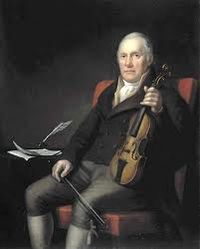Annotation:Miss Malcolm’s Hornpipe: Difference between revisions
(Created page with "'''Back to [[{{BASEPAGENAME}}]]''' ---- <p><font face="garamond, serif" size="4"> '''MISS MALCOLM'S HORNPIPE'''. Scottish, Hornpipe. E Flat Major (Marshall): D Major (Miller)....") |
No edit summary |
||
| Line 2: | Line 2: | ||
---- | ---- | ||
<p><font face="garamond, serif" size="4"> | <p><font face="garamond, serif" size="4"> | ||
'''MISS MALCOLM'S HORNPIPE'''. Scottish, Hornpipe. E Flat Major (Marshall): D Major (Miller). Standard tuning. AB (Marshall): AABB (Miller). Composed by William Marshall (1748-1833). A Scottish fiddler and composer, Marshall is most famous for his many fine strathspeys. Marshall worked for much of his life for the Duke of Gordon as the Steward of his Household, and it is fortunate that the Duke was an enthusiastic supporter and patron of Marshall’s music. | '''MISS MALCOLM'S HORNPIPE'''. Scottish, Hornpipe. E Flat Major (Marshall): D Major (Miller). Standard tuning. AB (Marshall): AABB (Miller). Composed by William Marshall (1748-1833). A Scottish fiddler and composer, Marshall is most famous for his many fine strathspeys. Marshall worked for much of his life for the Duke of Gordon as the Steward of his Household, and it is fortunate that the Duke was an enthusiastic supporter and patron of Marshall’s music. | ||
[[File:marshall.jpg|200px|thumb|left|William Marshall]] | |||
<br> | <br> | ||
<br> | <br> | ||
Revision as of 04:46, 12 July 2012
Back to Miss Malcolm’s Hornpipe
MISS MALCOLM'S HORNPIPE. Scottish, Hornpipe. E Flat Major (Marshall): D Major (Miller). Standard tuning. AB (Marshall): AABB (Miller). Composed by William Marshall (1748-1833). A Scottish fiddler and composer, Marshall is most famous for his many fine strathspeys. Marshall worked for much of his life for the Duke of Gordon as the Steward of his Household, and it is fortunate that the Duke was an enthusiastic supporter and patron of Marshall’s music.

Source for notated version:
Printed sources: Marshall, Fiddlecase Edition, 1978; 1822 Collection, p. 22. Miller (Fiddler’s Throne), 2004; No. 299, p. 177.
Recorded sources:
Back to Miss Malcolm’s Hornpipe
